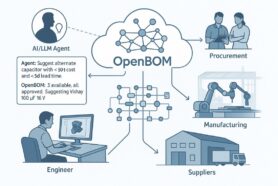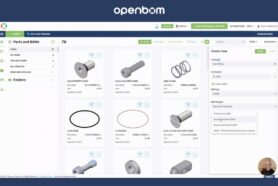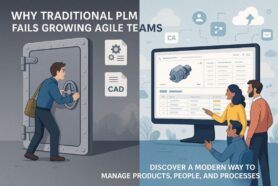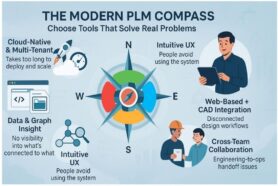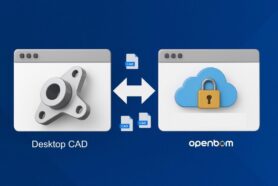
Is your data safe in OpenBOM? According to Gartner, a leading IT research and advisory company, we live in the “cloud shift” trend.
Gartner’s ‘cloud shift’ research includes only those enterprise IT categories that can transition to the cloud, within the application software, infrastructure software, business process services, and system infrastructure markets. By 2025, 51% of IT spending in these four categories will have shifted from traditional solutions to the public cloud, compared to 41% in 2022. Almost two-thirds (65.9%) of spending on application software will be directed toward cloud technologies in 2025, up from 57.7% in 2022.
This shift to the cloud is being driven by the need for businesses to become more agile and innovative. But with so much sensitive data moving to the cloud, security is a top concern. So how safe is your data in OpenBOM?
Modern Manufacturing and Digital Thread
Security is on top of everyone’s mind these days. Gathering data and storing it in online services (SaaS providers) is quickly becoming the easiest and widely adopted. During the last decade, cloud strategy was adopted by practically all product lifecycle management software vendors. Started as so-called “on-demand software”, it transformed into the cloud or SaaS (Software as a Service) and it covers multiple domains of customer data management, business processes, and product data management. According to the recent CIMdata research, 66% of large industrial companies are looking at how to switch to the SaaS model and looking how to replace legacy on-premises software with new SaaS applications. Moreover, companies are investing in extending their data management and product lifecycle management practices in the extended engineering teams and contract manufacturing. Working with suppliers and CMs online is quickly becoming an essential requirement. This is where the digital thread begins.
Manufacturing companies are looking at how to adopt machine learning, and artificial intelligence and provide access to real-time data.
As companies grow in their digital features, providing secure data management services is becoming increasingly important. In this blog post, we’ll take a look at some of the security features built into OpenBOM and how they keep your data safe.
Why should I care about data security?
We are all aware of data security in a modern connected world. Security became a part of our everyday life. From day one of computer existence, they became the target of hackers and potential security risks as they store data that is vulnerable and might present interest to thieves, competitors, and intelligence. Whether it is done for fun or hired for a purpose, hackers can potentially breach any system. No company is invulnerable. In this article, I won’t cover how to protect all your data, but I will focus on how OpenBOM SaaS platforms protect the data you store in OpenBOM when managing product information such as Product records (Items, BOMs), CAD Files, Orders and all other related information.
What is this “SaaS” or “Cloud” and Why It Is More Secured?
Cloud computing has been around for many years. Even if you haven’t heard about it, you most probably use it every day as you use Google Docs and Web mails, store files in Dropbox or Google Drive, and do some other activities such as online banking or shopping. You have no idea where the data goes, but the power and beauty of the services like that are that you can safely store information and get it everywhere at any time with minimum IT knowledge (no need to configure NAS drives, routers, firewalls, VPNs, etc.). You just go to the browser or to an application installed on your computer and access the information.
If all your data is stored on your personal computer or company server in a fireproof room, how sending data over to your co-workers, contractors, and suppliers can be more secure. The last 2 years of COVID, put everyone to stress in their ability to get data remotely. We’ve been contacted by customers that had their files stored in their company servers, Excel spreadsheets, and desktops looking at how safely to get this information out and share it with everyone who needs to get this information.
Once your data needs to leave your desktop computer or company server environment in files (even if you have a PDM system that manages files in the vault), these data can be potentially extracted and stolen. The fact of existence of Excel files is already a threat to your security. By sending BOM in Excel with CAD file attachment via web email or sharing it in public cloud storage already made it potentially available. The level of ignorance of passwords is skyrocketing when companies need to send data quickly to contractors and suppliers.
Cloud/SaaS environment gives you much better security protection because it eliminates the need to manage files and provides single universal security access to the data. There are no files, the data is stored in the databases in a secured way and accessed via browsers with a secured login. Even if you want to save the data, you cannot do it if you’re not allowed to export the data (defined by administrators).
How You Can Lose Your Data With Excels, Emails, and Local Databases?
There are multiple ways you can lose your data or put it at risk. Here are a few scenarios that we commonly see happening to the engineering teams and manufacturing companies.
- Sending BOM Excels and CAD files to customers, contractors, and suppliers
- Transferring data using external media (eg. USB sticks or external drives)
- Uploading BOMs to the public cloud or temporary transfer storage
- Expose data by displeased or unhappy employees
- A hardware malfunction or human errors
Proper data governance and security applied in online (SaaS) services can decrease the risk of potential data exposure mentioned above.
7 Ways OpenBOM Makes Your Data Secured
Here at OpenBOM, we take security seriously to allow you and your team to focus time on what you need to do – manufacturing products. At OpenBOM, we are proud that we can provide our customers with innovative products and security practices that conform to industry standards.
Here are OpenBOM features and mechanisms that make your data stored in OpenBOM more secure and can reduce the potential risk of exposing your data stored in OpenBOM.
Secured Sharing
OpenBOM data sharing mechanism is the foundation of the user security model. It allows you to grant permission when you share information (items, catalogs, BOMs). OpenBOM provides a granular data sharing access model to allow other users to see, edit or share information.
Login, Password Protection
OpenBOM is using Okta, the number #1 identify platform to manage users and passwords for OpenBOM. OpenBOM never stores customer passwords in an encrypted way using Okta, so passwords cannot be compromised. In addition to that OpenBOM provides MFA / 2FA service to advanced secured login using Google Authentication (or similar application) for code management.
Multi-factor authentication
OpenBOM operations personnel can access the server environment only via a special authentication mechanism and secured passwords and 2FA.
Communication Security
OpenBOM is using HTTPS and TLS/SSL for all services including OpenBOM public website, training library website, and all applications installed in CAD systems. We have an automatic testing mechanism to validate the availability of our services and the operation team monitors our services all the time.
Encryption
All data stored in OpenBOM is stored in databases and AWS file storage is fully encrypted with AES-256. OpenBOM encrypts data in both (at rest and in transit) modes, so your data is fully encrypted from the moment of time it leaves your computer or device.
Database backups
OpenBOM continuously backup databases and creates redundancy in data storage mechanisms that minimize the risks of data loss in case of an emergency or computing failures
AWS Physical Security
OpenBOM is built upon the AWS (Amazon Web Services) PaaS infrastructure and IaaS platform. AWS EC2 was chosen as one of the most secured and powerful cloud infrastructures to support the OpenBOM platform. It includes globally distributed and physically secured data centers with redundant power, cooling, and networking. AWS has achieved multiple US and global security and quality certification including ISO 9001, ISO 27001, SOC-2 Type 2., FIPS 140-2, and NIST 800-53.
OpenBOM is using AWS Virtual Private Cloud (VPC) technology to isolate and secure network traffic in and out of the OpenBOM service.
Conclusion
OpenBOM is continuously investing in mechanisms, features, and processes to ensure that the data you store in OpenBOM is secured and protected. Check for more information about OpenBOM security on our website – OpenBOM Security.
REGISTER FOR FREE to check how OpenBOM can help you today.
Best, Oleg
Join our newsletter to receive a weekly portion of news, articles, and tips about OpenBOM and our community.




